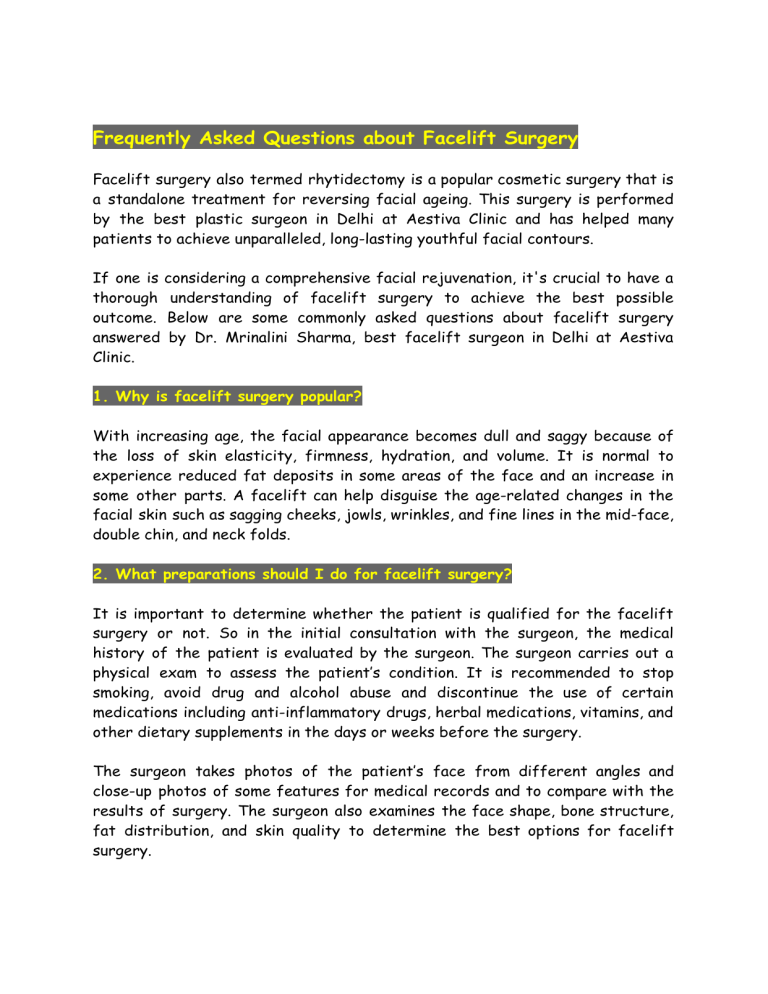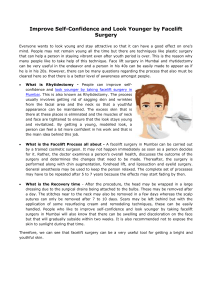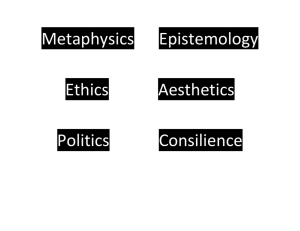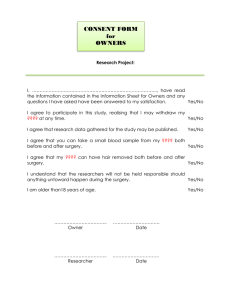
Frequently Asked Questions about Facelift Surgery Facelift surgery also termed rhytidectomy is a popular cosmetic surgery that is a standalone treatment for reversing facial ageing. This surgery is performed by the best plastic surgeon in Delhi at Aestiva Clinic and has helped many patients to achieve unparalleled, long-lasting youthful facial contours. If one is considering a comprehensive facial rejuvenation, it's crucial to have a thorough understanding of facelift surgery to achieve the best possible outcome. Below are some commonly asked questions about facelift surgery answered by Dr. Mrinalini Sharma, best facelift surgeon in Delhi at Aestiva Clinic. 1. Why is facelift surgery popular? With increasing age, the facial appearance becomes dull and saggy because of the loss of skin elasticity, firmness, hydration, and volume. It is normal to experience reduced fat deposits in some areas of the face and an increase in some other parts. A facelift can help disguise the age-related changes in the facial skin such as sagging cheeks, jowls, wrinkles, and fine lines in the mid-face, double chin, and neck folds. 2. What preparations should I do for facelift surgery? It is important to determine whether the patient is qualified for the facelift surgery or not. So in the initial consultation with the surgeon, the medical history of the patient is evaluated by the surgeon. The surgeon carries out a physical exam to assess the patient’s condition. It is recommended to stop smoking, avoid drug and alcohol abuse and discontinue the use of certain medications including anti-inflammatory drugs, herbal medications, vitamins, and other dietary supplements in the days or weeks before the surgery. The surgeon takes photos of the patient’s face from different angles and close-up photos of some features for medical records and to compare with the results of surgery. The surgeon also examines the face shape, bone structure, fat distribution, and skin quality to determine the best options for facelift surgery. On the day of surgery, the patients are likely asked to wash their face and hair with germicidal soap. The patients must also follow the instructions recommended by the doctor to prepare for a facelift which must be strictly followed. 3. How facelift surgery is performed? Face-lift surgery is performed under general anaesthesia, local anaesthesia, or IV sedation depending upon the extent of work required. Firstly, incisions are made in the hidden part of the face i.e. along the hairline and the ears. Then, the skin envelope is lifted, the underlying face and neck muscles are tightened, and the remaining skin is re-draped. The excess skin is surgically excised and absorbable sutures are used to close the incisions. The cost of facelift surgery in Delhi depends on the extent of changes required, patient age, and surgeon experience. 4. How long does facelift surgery take? The time taken for the surgery to complete depends upon the extent of the procedure and it varies among different patients. On average, it lasts for 3 to 4 hours. A simple mid-facelift is expected to end in approximately two hours while about five to six hours is required for a facelift combined with neck lift and blepharoplasty. 5. How many types of incisions are required in the surgery? The incision pattern may differ according to the type of facelift surgery planned such as: (a) In a traditional facelift, the incision is made from the temple area, in front of the ear, the back of the ear that eventually disappears into the hairline at the back; (b) In a mini facelift, the incision starts from the temple, goes down to the front of the ear, and ends after taking a turn around the earlobe. (c) In neck lift, the incision is made in front of the earlobe and behind the ear. To have access to sagging neck muscles, a cut is made underneath the chin. 6. When will I fully recover from a facelift? The patients undergo different stages of healing. In the first phase that lasts for 10 days, the swelling and bruising are at their peak on the fourth day after which it eventually subsides. In the next stage i.e. from 10 to 14 days, some patients can resume work and social activities. The last stage of healing starts from 3 weeks to 6 months after the surgery after which final results appear. Most patients achieve the visible outcome of the surgery after 3 months. 7. How long do the results of facelift surgery last? Facelift results are not permanent. The skin may begin to droop again and lose elasticity with age. Facelift surgery can be expected to last for 10-15 years. Candidates can follow up with other procedures if they wish. 8. What other procedures can be combined with facelift surgery for a younger look? To fill in the compartments of the face that may have been depleted of natural volume, fat grafting is commonly performed along with facelift surgery. Other procedures carried out during a facelift are eyelid surgery, brow lifts, chin implants, and lip lifting. To get the benefits of Facelift surgery in Delhi, schedule a consultation with the expert surgeon at Aestiva Clinic, best plastic and cosmetic surgery clinic in India.




